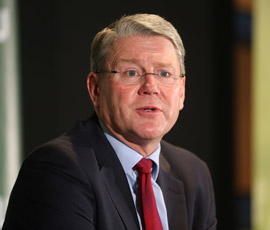NFU wants two-stage approach to modulation

The NFU has insisted that the government could modulate at 9% – rather than its proposed 15% – and still continue to fund agri-environment schemes.
Responding to DEFRA’s consultation paper on CAP reform implementation, the union said the government should consider a staged approach to modulation rates.
DEFRA has said it thinks there is a strong case to move 15% of funds from direct payments (Pillar 1 of the CAP) to rural development schemes (Pillar 2 of the CAP).
“We believe that rewarding farmers for the environmental goods they provide is a much better use of taxpayers’ money than providing direct subsidy.”
NFU president Peter Kendall said he intended to hold the government to its word that it would only modulate at 15% if it can demonstrate it would deliver worthwhile and valuable outcomes for farming and society.
“We know that new schemes take time to design and make operational and we therefore believe that it would be much more appropriate to make use of the flexibility available to government to implement a two staged approach to future modulation rates, if additional funds are required.
“Based on our own internal calculation we believe that government could afford to levy modulation at no more than 9% initially, and then this would continue to finance half of the Entry Level Scheme (ELS) and maintain everything else at current levels in the Rural Development Programme for England.”
“Based on our own internal calculation we believe that government could afford to levy modulation at no more than 9% initially, and then this would continue to finance half of the Entry Level Scheme (ELS) and maintain everything else at current levels in the Rural Development Programme for England.”
Peter Kendall, NFU president
Given that ELS was closed to new applicants and a successor scheme would not be open until 2016, if DEFRA transferred 15% from next year the government would be “simply creating a war chest of modulated funds, which could disappear out of the farming industry”, said Mr Kendall.
He acknowledged that the decision to follow the EU’s approach to greening, rather than a national certification scheme was very good news.
But added: “However, it is disappointing that DEFRA looks like it will close the door on giving flexibility to farmers troubled by the requirement to grow three different crops on arable land.
“The NFU is not ready to give up on that yet.”
Meanwhile, the Wildlife Trusts have hit out at the fact that the public only have 28 days to respond to the consultation.
It welcomed the government’s support for 15% modulation, but said it was gravely concerned that overall budget cuts will mean a halving of the area of land benefiting from farm environment schemes.
“Additionally, we are extremely disappointed at the government’s lack of ambition on implementation of the new ‘greening’ measures, which are linked to 30% of the payments that all farmers receive.
“The consultation makes it clear that it intends to implement greening in a way that keeps close to the basic European requirements,” it said.
Read more on CAP reform on our dedicated page
